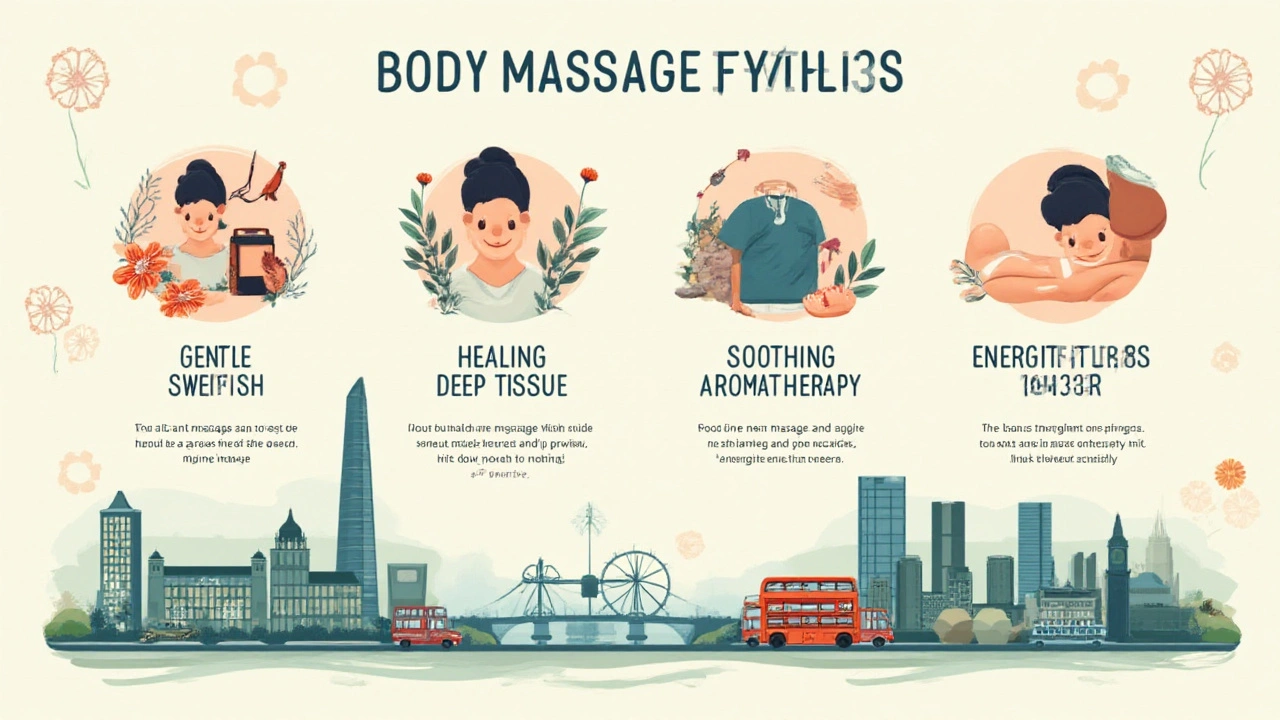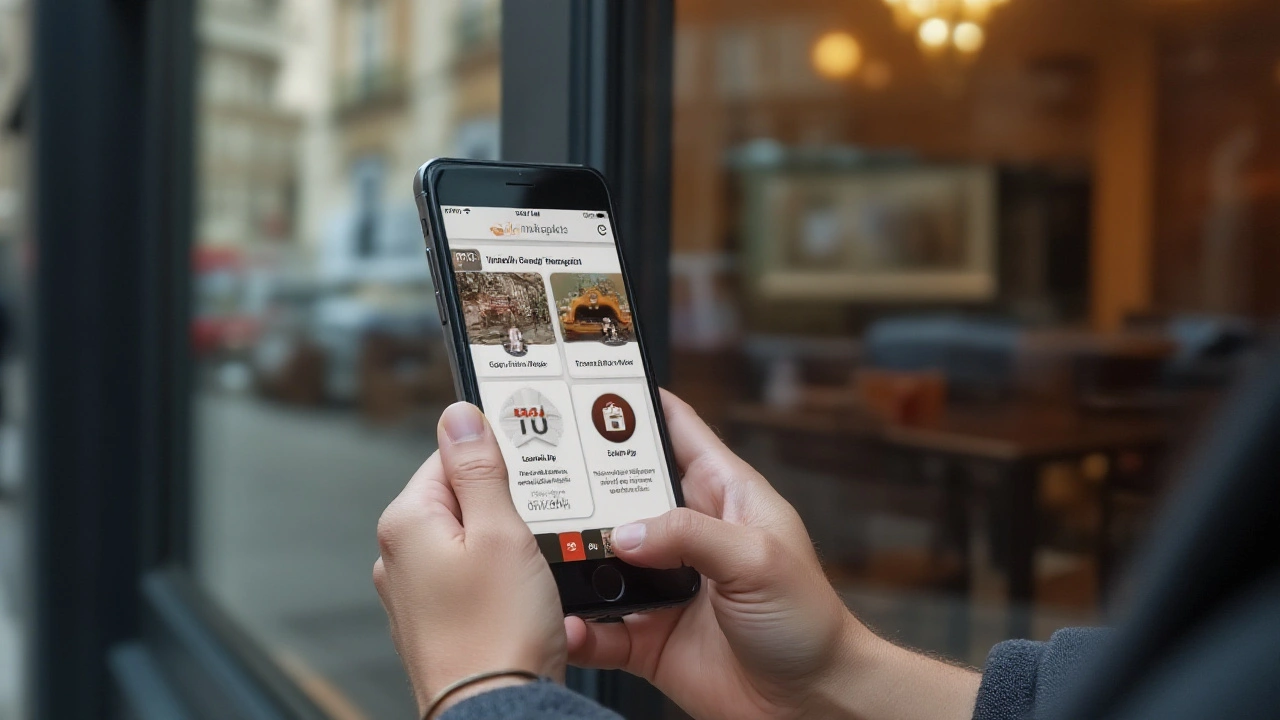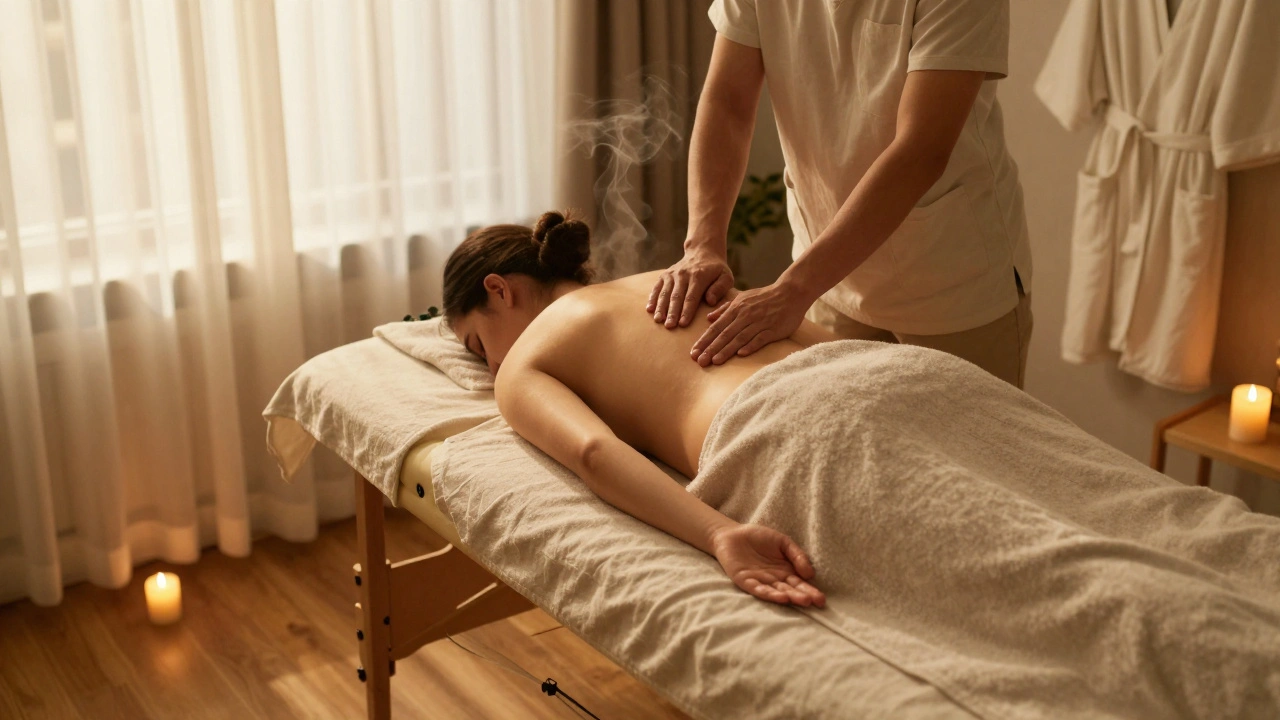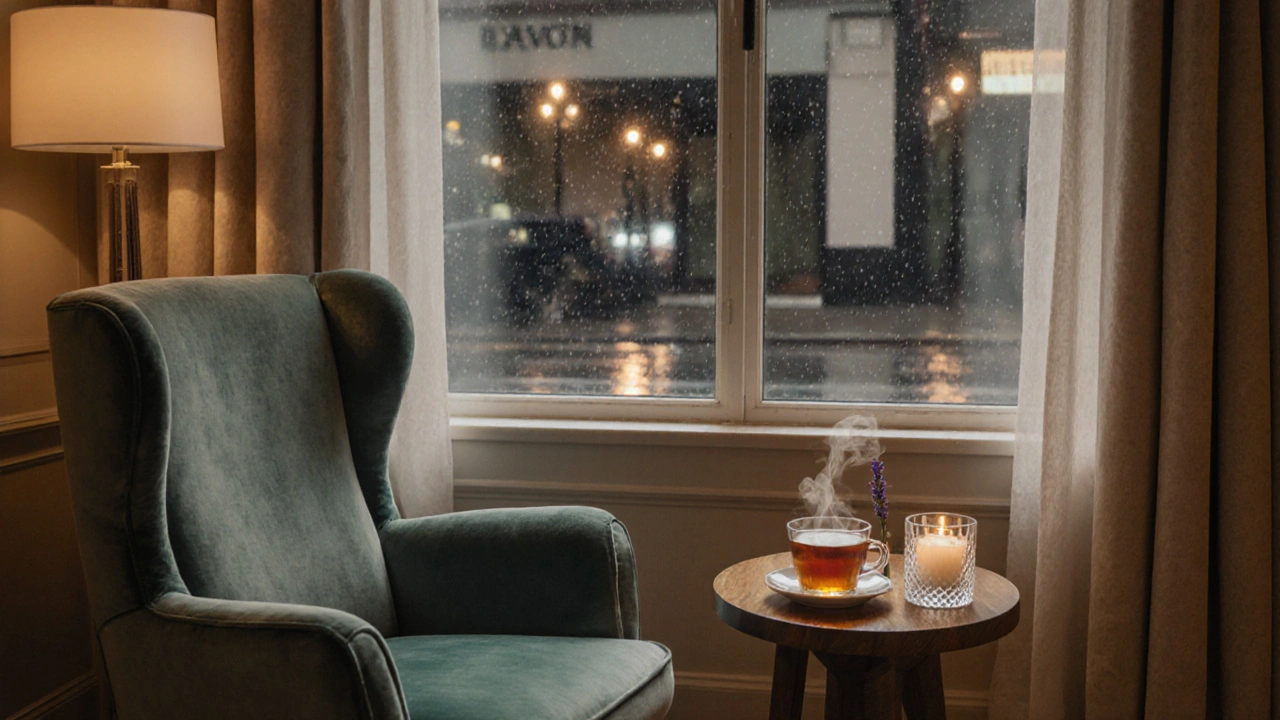Ever found yourself wishing for a moment of escape from the London rush, where the only thing on your mind is pure relaxation? Body massage isn’t just an indulgence—it’s almost a Londoner’s lifehack. In a city where everyone always seems to be on the go, finding the right way to unwind is a game-changer. But how do you even start choosing between all the options, from slick hotel spas to little-known treasures tucked away on local high streets? This isn’t just about pampering; it’s about taking care of your mind and body, and making your week a whole lot better.
Definition and Context: What Are Body Massage Services in London?
So, what exactly are body massage services in London? At its core, we’re talking about a wide range of techniques that focus on relaxing muscles, relieving tension, and sometimes even boosting your mood. You’ll find everything from deep tissue massage for those stubborn knots, to gentle aromatherapy sessions that drift you into a new headspace, all in the heart of the UK’s busiest city. Body massage is a service offered by trained professionals—and in London, you’ll meet therapists with backgrounds in physiotherapy, reflexology, sports therapy, or spa-based relaxation.
Body massage services in London run the gamut from quick 30-minute shoulder releases at bustling train station pop-ups to full “spa day” escapes in five-star hotels. Why does this matter for Londoners? Because stress runs high in a city where getting from A to B can feel like running a marathon. Studies from the UK’s National Health Service show that over 70% of London adults deal with stress-related symptoms on a monthly basis. Massage isn’t a luxury here—it’s a practical tool used by everyone from office workers hunched over laptops to athletes training in Regent’s Park.
Body massages in London reflect the city’s diversity. You’ll find Thai, Swedish, Shiatsu, deep tissue, sports, and even more niche styles—all adapted to suit different lifestyles. Some places are open late to catch post-commute crowds (props to those Soho basements still going strong at 10pm). The breadth of what’s on offer means there’s a perfect fit, whether you need targeted muscle work after a long cycling commute or just a calming hour away from the urban grind.
Thanks to London’s global flavor, you’ll spot cultural influences everywhere. Areas like Chinatown, Notting Hill, and Kensington offer styles from across the world, each therapist adding their own twist or tradition to the mix. There’s even been a sharp rise in mindfulness-based massages and treatments that blend touch therapy with mental relaxation—right on trend as more Londoners search for holistic wellness in 2025.
Benefits of Body Massage: Real Changes You’ll Notice
Let’s get real—why should you even care about body massage? Because the benefits go so far beyond just “feeling relaxed.” London’s best therapists are quick to point out that regular massages can seriously boost your quality of life. Here’s the lowdown:
- Stress relief: Imagine shaking off the pressure from work or crowded Tube rides. Massage physically reduces cortisol, a hormone that loves to run wild under stress. Less cortisol? Clearer head, calmer mood.
- Muscle recovery: Urban life means you’re always moving, standing, or sitting in weird positions. Regular massage helps muscles recover, reduces the risk of repetitive strain injuries, and can even tackle chronic pain.
- Better sleep: Ever had one of those nights where you drift off the moment your head hits the pillow? Massage increases serotonin and melatonin, making deep, restful sleep come easier.
- Joint flexibility: You’ll find a lot of regulars at London massage studios are runners, cyclists, or gym-goers. Massage keeps you limber, helps joints recover, and even speeds up healing after minor injuries.
- Mood boost: Touch therapy can reduce symptoms of anxiety and mild depression. In a city with famously gloomy winters, that’s not to be underestimated!
- Detoxification: Some techniques stimulate the lymphatic system, which encourages natural detox and boosts your immune response. Not magic, but definitely helpful when flu season hits.
In fact, one 2023 survey from the British Spa Association showed that 68% of Londoners who got monthly massages reported fewer headaches, better digestion, and sharper focus at work. No wonder these places are always booked out on Mondays!
Personal stories back this up. Take Anna, a freelance designer from Hackney, who says her weekly back massage is “the one hour a week where my anxiety actually switches off.” Or Marcus, who swears by sports massage at his local studio to keep his marathon training on track. It’s not a miracle cure, but it really can transform how you move through life in this city.
Types of Body Massage Available in London
If you’re feeling overwhelmed by choice, you aren’t alone. London’s massage scene is vast—let’s break down some of the main types you’ll bump into, so you know what you’re walking into when scanning menus or scrolling app listings:
- Swedish massage: The crowd-pleaser. Think gentle, long strokes for full relaxation—perfect if you’re new to massage.
- Deep tissue: Targets stubborn knots using firmer pressure. If you’re sitting at a desk all day or recently did a hardcore workout, this could be your best bet.
- Thai massage: You’ll stay dressed in loose clothes, and the therapist uses stretching and pressure. It’s energizing and kind of like yoga (except you don’t have to do the work!).
- Aromatherapy massage: Blends essential oils with soft strokes—great if you need a treat for your senses and mind.
- Sports massage: Tailored for people who exercise a lot. Focuses on sports injuries, muscle imbalances, and general recovery.
- Hot stone massage: The therapist uses warm stones to soothe tight muscles—a popular choice for colder months.
- Reflexology: Focuses on pressure points, often on the feet, but linked to benefits for the whole body.
- Chair massage: Think quick sessions in busy spots like offices or airports. Super convenient if you only have 15 minutes to spare.
London has some lesser-known options, too. Lymphatic drainage massage, for example, is big in Chelsea for those paying attention to detox and wellness trends. A few Spitalfields studios offer Ayurvedic therapies rooted in Indian traditions. And don’t forget body-to-body, tantric, or Nuru massages—a bit more niche, but very much part of London’s diverse scene for those seeking sensual relaxation (just be sure you’re visiting a reputable and legal establishment).
You can expect something unique in each London neighborhood. Fitzrovia’s boutique spas might focus on mindfulness and calming ambiance, while Shoreditch brings creative treatments with modern twists. South Kensington’s wellness centers often go for holistic options that blend massage with sound therapy, crystals, or guided meditation. Wherever you are, there’s likely a style that matches your vibe and comfort level.
How to Find the Best Body Massage Services in London
The real challenge for most? Tracking down the right place! With so many choices, you’ll want to zero in on spots that match your needs—and budget. Start with recommendations from friends or coworkers if you trust their taste. Otherwise, online reviews on platforms like Google, Treatwell, or TripAdvisor can give you genuine insights, especially when it comes to cleanliness, professionalism, and the overall atmosphere.
For those new to London, search engines are your friend. Look for “body massage London,” “best massage services in London,” or get more specific by adding your neighborhood: “body massage Shoreditch” or “deep tissue massage Notting Hill.” This helps you narrow it down and spot top-rated salons or studios nearby. Booking apps, especially popular ones like Urban or Secret Spa, let you filter by massage type, therapist gender, and even languages spoken—great if you’ve got a preference or want to feel extra comfortable.
Keep an eye out for therapist credentials. Legitimate places will highlight qualifications—look for mention of diplomas from institutions like the London School of Massage, ITEC certification, or affiliation with organizations like the Federation of Holistic Therapists (FHT). Bigger chains are usually a safe bet, but don’t rule out small independent studios—you’ll often get a more personalized service.
If you prefer massages at home, on-demand “mobile” or “outcall” services can be booked right to your door. These are a hit with busy professionals or parents. Check reviews for punctuality and professionalism, and make sure therapists bring all supplies, from massage tables to fresh towels and oils. If you’d rather see what’s around you, lots of local papers or community notice boards post special offers and last-minute deals, especially for off-peak slots midweek.
Here’s a quick look at the most popular neighborhoods for body massage in London:
| Neighborhood | Type of Massage | Typical Price Range (£) |
|---|---|---|
| Soho | Deep Tissue, Thai, Erotic | 60-150 |
| Kensington | Hot Stone, Aromatherapy, Swedish | 70-200 |
| Shoreditch | Sports, Reflexology, Modern Fusion | 50-120 |
| Mayfair | Luxury Spa, Wellness | 100-300 |
This table is just a snapshot—areas outside central London can have much better deals, especially if you’re willing to travel a bit.

What to Expect During a Session: From Booking to Bliss
Wondering what actually happens when you book a massage session? Once you pick a place, most studios let you book online, over the phone, or even walk in. Double-check your booking confirmation for details on what you need to bring or if you should arrive early. You’ll usually be asked to fill out a quick health form, which just helps the therapist tailor the massage to your needs or avoid any issues if you have injuries, allergies, or are pregnant.
When you arrive (ideally 5-10 minutes early), a friendly receptionist or the therapist will greet you, show you around, and offer you water or sometimes tea. You’ll be led to a treatment room that’s clean, private, and often softly lit, with chill background music—very much designed to put you at ease. Don’t worry if you’re nervous about undressing; therapists are respectful about privacy and will explain what to remove (usually just down to underwear, with towels or blankets for draping).
The therapist will review your health form, ask what you want to focus on, and check your comfort with pressure and techniques. If you booked aromatherapy, you might even get to pick an oil blend. From here, you lie back and let the magic happen! Don’t be shy to speak up if the pressure is too much or not enough—good therapists want you to leave happy. For first-timers, expect a sense of gentle muscle stretching, warmth from oils, and a gradual sense of calm. Some people even doze off (it’s that relaxing!).
After your massage, you might feel a bit spacey or dehydrated—totally normal. Most places will suggest you sip water to help flush out any toxins released from the muscles. It’s common to feel immediate relief if you had muscle tension, but deeper work can sometimes leave you a bit sore for a day or so—think of it like post-exercise soreness. Still, the glow usually outweighs any initial tenderness.
A quality studio or therapist will always leave you feeling cared for, with no pressure to rebook or buy products. Of course, tipping is always appreciated if the service blew you away.
Pricing and Booking: How Much Does Body Massage Cost in London?
There’s no one-size-fits-all answer here, but you should expect to pay anywhere between £40 and £300 for a body massage in London—hugely dependent on the location, style, and duration. A high-street studio or mobile therapist might charge £40-£60 for a basic 30-minute session. Full one-hour treatments in a nice spa start at around £60 and go up to £120+, while five-star hotels or exclusive wellness clubs in Mayfair can run you £200 and up for luxury packages. Aromatherapy, hot stone, or specialty massages may add a supplement of £10-£30.
Most studios make booking easy—use their direct website, popular apps like Treatwell, or phone up for last-minute slots. Watch out for deals around holidays, off-peak times, or packages (4 for the price of 3 is fairly standard if you know you’ll be back). Many wellness centers also offer loyalty cards if you want regular massages.
Here are a few tips to save money:
- Book off-peak (weekday afternoons often have the best deals)
- Look for introductory discounts for first-time clients
- Check student or NHS worker discounts—lots of small independents like to support the local community
- Consider group or couples packages if you want to share the experience
Safety Tips: Look After Yourself While Unwinding
London’s a huge, diverse city—so a little caution goes a long way. Here’s how to make sure your massage experience is not just relaxing, but safe and positive too:
- Only book with reputable studios or via trusted apps with verified therapists
- Check for visible licenses or certifications, especially if you’re booking a specialist massage (like sports or Thai)
- Read genuine reviews—if you see lots of mentions of unclean facilities or pushy upselling, steer clear
- Avoid places that offer “too good to be true” prices if the reviews don’t match up
- Be clear about boundaries—your comfort is the top priority
- If you’re unsure about any aspect (like oils or techniques), ask before the session begins
For anyone with specific health conditions—pregnancy, recent surgery, allergies, or chronic illnesses—always check with your doctor first and mention this to your therapist. Some treatments may not be suitable, or therapists might need to adapt techniques for your safety. Good professionals are used to these questions and want to make it work for you.
During your session, you’re always in control. If anything makes you uncomfortable, you can stop the massage at any time. This rarely happens at professional studios, but it’s always worth knowing your rights.
Comparison Table: Body Massage vs. Other Massage Services in London
| Massage Type | Focus Area | Typical Duration (min) | Best For | Average Price (£) |
|---|---|---|---|---|
| Body Massage | Full body (head, shoulders, back, legs) | 60-90 | General wellness, stress relief, muscle relaxation | 60-150 |
| Thai Massage | Whole body with stretching | 60-90 | Flexibility, energy boost | 70-160 |
| Foot Massage | Feet, lower legs | 30-60 | Targeted foot/leg relief | 30-90 |
| Sports Massage | Muscles, joints, areas of strain | 40-90 | Athletes, injury recovery | 65-200 |
| Outcall Massage | Any (client’s choice) | 60-120 | At-home comfort | 80-200 (travel fee) |

FAQ: Your Questions About Body Massage in London Answered
- Is it okay to ask for a female or male therapist? Absolutely—just mention when booking. Most places in London are very respectful of preferences.
- Do I need to tip the therapist? It’s not required, but always appreciated. Standard is 10-15%, but only if you’re happy with the service.
- Will I need to undress fully for a massage? Usually, you undress to your underwear. Therapists are trained to protect your modesty with towels at all times.
- Can massages help with anxiety or depression? Yes, research and personal accounts suggest regular massage can boost mood and ease symptoms, especially when combined with other therapies.
- How often should I get a massage? There’s no rule—some people go weekly, others monthly. Listen to your body and your schedule.
- What if I fall asleep or cry during a session? Totally normal! Falling asleep is common, and sometimes massage brings out emotions—just tell your therapist if you’re uncomfortable.
- Are there any hidden fees? No reputable studio will spring surprise fees—always check the booking terms and ask beforehand.
Ready to hit the reset button on your busy week? If you’ve ever dreamt of slipping into total relaxation without even having to leave your city, body massage London has something for everyone. Go ahead and give yourself a well-deserved break—the city (and your muscles) will still be there when you’re done!





Toni Plourde
August 2, 2025 AT 13:53London is really a hub for various therapeutic massage services, and having sorted through many of them professionally, I can say the diversity is impressive.
Different massage techniques serve different needs, and anyone keen on wellness should start with identifying what problem they want to address—be it stress, muscle tension, or energy flow issues.
Swedish massage generally works wonders for relaxation, whereas deep tissue massage targets stubborn muscle knots more effectively. Aromatherapy massages combine essential oils for a sensory boost that elevates mood alongside physical relaxation.
Booking ahead is crucial, especially for popular clinics or therapists with specialized skills. Usually, prices in London hover broadly from £50 to £120 per hour depending on location and expertise, so budgeting accordingly will help avoid surprises.
Safety-wise, ensure the therapist is accredited and maintains hygiene standards. A good spa will always encourage clients to communicate openly about pressure levels and any health conditions.
Overall, approaching massage with a clear goal helps maximize the benefits you gain from your session. Would love to hear about others’ personal favorites in London!
Abhinav Singh
August 7, 2025 AT 11:46Hey, I appreciate this post because wellness is often overlooked in fast-paced cities like London.
From my experience, finding local favorites is about personal preferences and what resonates with your body and mind's needs. I recently tried Thai massage here which was a unique blend of acupuncture techniques and yoga-like stretching—not quite like anything else.
It’s worth exploring different methods and seeing what creates that harmony within. Also, don't hesitate to ask for consultation before booking; many places offer initial guidance to match you with the right treatment.
Pricing can be steep but sometimes splurging on quality far outweighs the short-term savings from cheaper options, especially when it relates to health.
Safety comes first, always be thorough about checks, and your mind can relax knowing you are in good hands.
g saravanan
August 10, 2025 AT 07:50The holistic experience of a body massage transcends mere physical touch; it is, indeed, an alchemical process of uniting the corporeal and spiritual aspects.
In the vibrant metropolis of London, the availability of diverse massage modalities offers seekers a passage into myriad pathways toward reconnection with their own essence.
When one contemplates the act of booking a session, one must consider not just the transactional nature but the relational and intentional dimension that colors the encounter.
Safety protocols manifest as the sacred boundaries safeguarding not only physical integrity but emotional and psychological sanctity.
Pricing, while often perceived through the prism of market economics, subtly encodes the value accorded to one’s well-being.
Thus, navigating the quest for the ultimate relaxation guide calls for an informed yet intuitive approach, an interplay between mind's logic and heart’s wisdom.
Neha Sharma
August 13, 2025 AT 23:20Honestly, if you’re in London and looking for the best massage, don’t settle for anything less than what genuinely makes you feel chill and comfortable.
There’s way too much noise about pricing and fancy places when what really matters is how your body responds to the treatment.
Some places have great vibes but can be pricey, others might be more affordable but not that skilled with pressure or techniques.
One thing I can’t stand is when therapists push their agenda or ignore your feedback during the massage—that’s a total no-go.
Make sure you communicate clearly about what you want—if that’s relaxation or deep tissue, or just a light touch for stress relief.
Also, safety and hygiene are non-negotiables. If something feels off, never hesitate to stop the session.
Trust your instincts, take your time researching, and you’ll find the gem that suits your needs.
Nancy Espinoza
August 17, 2025 AT 15:40This is such a beautifully curated guide, but can I just say sometimes the journey to relaxation is more about the ambience than just the technique?
The lighting, smell of essential oils, the calm hush of soothing music... all of these sensorial elements transport you into a realm of tranquility that words often fail to capture.
For me, the psychological release is just as vital as the physical relief offered by the massage.
I’m curious about the types of massages available because each seems to have its own story and history—like Swedish, Shiatsu, or even hot stone therapy.
Maybe a post outlining each massage type's origins and cultural significance would enrich this already fantastic guide?
Also, those little extras like herbal teas after the session add so much to the experience and should definitely be part of what we consider when choosing a provider.
Lorna Jamieson
August 22, 2025 AT 18:26Wow, while we're all chatting about massage services, let's not forget the ultra-luxury spots in London that absolutely redefine the experience. 😍
I mean, if you really want to splash out, there are places with heated marble tables, crystal-infused oils, and therapists trained in ancient, secret techniques passed down for generations. ✨
Not to mention, the ambiance is crafted by lighting specialists and sound designers to encapsulate pure bliss.
Sure, the prices are jaw-dropping, but honestly, it’s an investment in your aura and stature. You deserve to feel like royalty, darling! 👑
For those who want to dive into a world of opulence, these elite services offer more than just relaxation—they offer transformation.
Not everyone can handle the sheer extravagance, but if you ask me, it’s worth every penny. 💎💆♀️
Melissa Jeanne
August 25, 2025 AT 22:33I appreciate the comprehensive nature of this guide, but I wish there was a bit more emphasis on post-massage care—like stretching, hydration, and maybe even meditative breathing exercises.
Sometimes people underestimate how vital these steps are in extending the benefits of any massage session.
Also, it’s pretty crucial to remind folks to keep open and respectful communication with their therapists.
Boundaries matter a lot, and if you don’t feel comfortable at any point, just say so.
Lastly, a quick mention of contraindications or when not to get certain massages could be super helpful so that people avoid hurting themselves unknowingly.
All in all, great post, and it definitely sparked my curiosity to explore London’s wellness scene more.
Chad Johnson
August 29, 2025 AT 08:46The whole massage industry makes me a bit suspicious sometimes, you know?
There’s this whole commercial angle with upsells, memberships, and ‘exclusive packages’ that seem designed to milk customers rather than heal them.
Plus, you gotta watch out for therapists who might over-promise and under-deliver, or even those shady places where hygiene seems questionable but they cut costs.
That’s why vetting the clinic thoroughly before your session is crucial; online reviews and testimonials aren't just fluff—they can be lifesavers.
Also, if you believe in the deeper energies, some places might not be legitimate in their methods, so caution is key.
Stay informed, stay skeptical, but also stay open to genuine healing experiences.
Krunal Ronak
September 1, 2025 AT 06:13Honestly, the thought of trusting complete strangers with my body in a city as big and hectic as London triggers all kinds of paranoid alarms in me.
Are these places really as safe as they claim? Or is there a hidden agenda with cheap labor or subpar training hiding behind the polished facade?
Sometimes I feel that these massage centers might be fronts or hooks for other businesses that are not as legit.
So yeah, while I want to relax and enjoy, I can’t help but stay hyper-vigilant about every aspect—from licensing to discreet behaviors during sessions.
Maybe I’m overthinking but peace of mind matters hugely when it comes to bodily care.
I’d love some recommendations here from folks who’ve done thorough checks or have insider knowledge about trustworthy places.